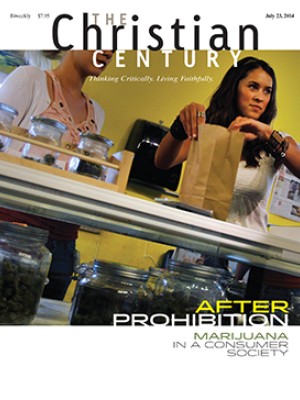Sunday, August 3, 2014: Matthew 14:13-21
The people are hungry. Jesus' solution is even more improbable than the disciples' solution.
A couple of times a summer, a thin man dressed in black would politely knock on our back door about an hour before suppertime. His face looked old and weather-beaten, and despite the heat he always wore layers of clothing. The little cart with his belongings sat by the front gate.
He would ask my mom if there was any food he could have that night. So she made extra of whatever she was preparing for dinner, keeping me inside the house while the man waited on the back steps. She filled a plate for him, and he sat on the steps and ate. After finishing his dinner he knocked on the door, said thank you, and continued on his way.
Read our latest issue or browse back issues.
Afterward my dad would launch into stories of the many hobos who passed through our small Pennsylvania town on freight trains during the Depression, looking for a meal and sometimes sleeping in the sheds at the family feed mill. “They’re homeless,” said my dad, “down on their luck, and it’s good for us to feed them.”
My mom’s action, supported by my dad, left a deep impression on me. If she could feed someone so strange and different in our own yard, right outside our back door, I had some thinking to do about who belongs in our circle of interest and concern.
Sixty years later, when I pray about Matthew’s telling of the feeding of the multitude, it’s the words “You give them something to eat” that beckon. Like my mother, I hear these words addressed to me. And like the first disciples, I’m overwhelmed. For that flawed yet oddly dependable network of people responding to late-afternoon knocks on the door has long since disintegrated.
As Matthew tells the story, the disciples do recognize the problem. The people listening to Jesus by the lakeside are surely hungry, and the disciples have done their homework. As they see it, there’s precious little available here to eat. So they imagine a practical, albeit improbable, solution: send hordes of people off to neighboring villages to buy food.
Jesus’ startling response—“You give them something to eat!”—seems even more improbable. But as usual, Jesus is operating out of a different paradigm; he’s embodying a different script.
What Jesus says next is actually harder for me to accept: “Bring them”—the loaves and fishes—“here to me.” I am surely infected more than I know by an invasive script in North American politics and culture. This scarcity script tells me that I need to protect what I have and grasp for more. It encourages me to look after my own interests and succumb to new and ever more exotic cravings. In this paradigm, the common good barely registers. To even notice the hungry knocking on my door becomes profoundly countercultural.
It’s an act of faith, hope, and protest to band together with others in response to Jesus’ command to bring him what we have. When we do this, whatever we have is broken open, tampered with, ripped apart. It will never be the same again.
I’m startled to find a new script emerging, drawing me in. It’s a script that begins not in fear or obligation but in compassion, and it leads to awe. It’s a script in which we “rehearse the reign of God” together, as Diana Butler Bass puts it. Jesus blesses and breaks open what is surely not enough and dares us to offer it to others. As he does this, God’s economy of abundance emerges.
On my way to living into Jesus’ words in this story, I’ve joined the Spiritual Resources Council of the House of Friendship, a social services agency begun by Mennonites 75 years ago in Kitchener, Ontario. HoF focuses on food security, supportive housing, and addiction services. It’s a rehearsal hall of God’s reign.
In a recent reflection I gave there, I invited each council member to name a Bible story that HoF is living out right now. John, our executive director, chose the feeding of the multitude. The question facing the disciples often arises for our staff and board: How can we possibly feed all these people?
John has stories to tell. Years ago a local family heard of the need for potatoes and raised 2,000 pounds on their own; this has developed into an annual February potato blitz raising 300,000 pounds for distribution throughout the year. More recently, local faith leaders and others filled the gallery of a regional council meeting when funding for the community food hamper program was in danger of being cut. “When gifts of funding partners, church supporters, volunteer time, and staff time are offered and blessed,” claims John, “miracles of multiplication happen regularly.”
Perhaps I can help set the stage for such miracles when I pay attention to my own cravings for more. I can pray with Isaiah, “Why do you spend your money for that which is not bread, and your labor for that which does not satisfy? Listen carefully to me, and eat what is good.” For when my spirit is nourished, I catch a glimpse of God’s economy of abundance.






